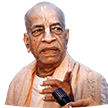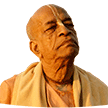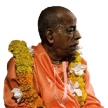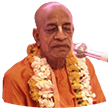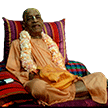Vasudeva - a glorious personality: Difference between revisions
(Created page with "Category:Glorious Personalities Category:Glorious Personalities from Bhagavad Gita Category:Glorious Personalities from Srimad Bhagavatam Category:Glorious Perso...") |
No edit summary |
||
| Line 10: | Line 10: | ||
{{Personalitiesnav}} | {{Personalitiesnav}} | ||
<!----------------- BEGIN STANDARD HEADING -----------------> | <!----------------- BEGIN STANDARD HEADING -----------------> | ||
Srila Prabhupada's books, lectures, conversations and letters reveal the qualities of this glorious personality as seen in the Vaniquotes '''[[Vaniquotes:Category:Vasudeva|Vasudeva]]''' category. An introduction from his teachings is given below in the following | Srila Prabhupada's books, lectures, conversations and letters reveal the qualities of this glorious personality as seen in the Vaniquotes '''[[Vaniquotes:Category:Vasudeva|Vasudeva]]''' category. An introduction from his teachings is given below in the following 8 quotes. | ||
<!----------------- END STANDARD HEADING -----------------> | <!----------------- END STANDARD HEADING -----------------> | ||
---- | ---- | ||
== Quotes from Srila Prabhupada's teachings == | == Quotes from Srila Prabhupada's teachings == | ||
<!----------------- edit quote boxes below this line -----------------> | <!----------------- edit quote boxes below this line -----------------> | ||
{{VaniQuotebox| | {{VaniQuotebox|It is to be understood that the Vasudeva referred to in this verse of Bhagavad-gita is Baladeva, or Balarama, because He is the original source of all incarnations and thus He is the sole source of Vasudeva|It is to be understood that the Vāsudeva referred to in this verse of Bhagavad-gītā is Baladeva, or Balarāma, because He is the original source of all incarnations and thus He is the sole source of Vāsudeva. The immediate expansions of the Lord are called svāṁśa (personal expansions), and there are also expansions called vibhinnāṁśa (separated expansions). '''(Bhagavad-gītā 10.37)'''}} | ||
{{VaniQuotebox| | {{VaniQuotebox|The same physical knowledge leading to the way of spiritual understanding helps one to end the miserable life of physical existence and to begin the life of spiritual existence on the plane of Vasudeva|The ultimate aim of physical knowledge is to satisfy the senses, which means prolongation of the term of material existence and thereby continuance of the threefold miseries. So prolonging the miserable life of material existence is nescience. But the same physical knowledge leading to the way of spiritual understanding helps one to end the miserable life of physical existence and to begin the life of spiritual existence on the plane of Vāsudeva. '''(Śrīmad-Bhāgavatam 1.2.28-29)'''}} | ||
{{VaniQuotebox| | {{VaniQuotebox|The stage of transcendental qualification is called suddha-sattva, or vasudeva, and in this stage the science of God can be realized|One has to transcend the mode of goodness also and be situated in unalloyed goodness, unaffected by any of the qualities of material nature. This stage of transcendental qualification is called śuddha-sattva, or vasudeva, and in this stage the science of God can be realized. As the Lord is not affected by the modes of material nature, so a pure devotee of the Lord is also not affected by the modes of nature. '''(Śrīmad-Bhāgavatam 3.4.31)'''}} | ||
{{VaniQuotebox| | {{VaniQuotebox|The stage of transcendental qualification is called suddha-sattva, or vasudeva, and in this stage the science of God can be realized|Stage of transcendental qualification is called śuddha-sattva, or vasudeva, and in this stage the science of God can be realized. As the Lord is not affected by the modes of material nature, so a pure devotee of the Lord is also not affected by the modes of nature. That is the primary qualification for being one with the Lord. A person who is able to attain this transcendental qualification is called jīvan-mukta, or liberated, even though he is apparently in material conditions. '''(Śrīmad-Bhāgavatam 3.4.31)'''}} | ||
{{VaniQuotebox| | {{VaniQuotebox|The Supreme Personality of Godhead is beyond darkness and passion. He is on the platform where goodness or knowledge is not disturbed by passion and ignorance. This is called the vasudeva platform|The Supreme Personality of Godhead is beyond darkness and passion. He is on the platform where goodness or knowledge is not disturbed by passion and ignorance. This is called the vasudeva platform. It is on this platform of vasudeva that Vāsudeva, or Kṛṣṇa, can appear. Thus Kṛṣṇa appeared on this planet as the son of Vasudeva. Because the Lord is situated beyond the three modes of material nature, He is unseen by those who are dominated by these three modes. '''(Śrīmad-Bhāgavatam 8.5.29)'''}} | ||
{{VaniQuotebox| | {{VaniQuotebox|It is also learned from the Hayasirsa-pancaratra that there are nine forms protecting the two Puris known as Mathura Puri and Dvaraka Puri. These nine forms are Vasudeva, Sankarsana, Pradyumna, Aniruddha, Narayana, Nrsimha, Hayagriva, Varaha and Brahma|It is also learned from the Hayaśīrṣa-pañcarātra that there are nine forms protecting the two Purīs known as Mathurā Purī and Dvārakā Purī. These nine forms are Vāsudeva, Saṅkarṣaṇa, Pradyumna, Aniruddha, Nārāyaṇa, Nṛsiṁha, Hayagrīva, Varāha and Brahmā. These are different manifestations of the prakāśa and vilāsa forms of Lord Kṛṣṇa. '''(Teachings of Lord Caitanya, Chapter 7)'''}} | ||
{{VaniQuotebox| | {{VaniQuotebox|Adhoksaja and Purusottama are the vilasa forms of Vasudeva. Similarly, Upendra and Acyuta are the vilasa forms of Sankarsana; Nrsimha and Janardana the vilasa forms of Pradyumna; and Hari and Krsna the vilasa forms of Aniruddha|Adhokṣaja and Puruṣottama are the vilāsa forms of Vāsudeva. Similarly, Upendra and Acyuta are the vilāsa forms of Saṅkarṣaṇa; Nṛsiṁha and Janārdana the vilāsa forms of Pradyumna; and Hari and Kṛṣṇa the vilāsa forms of Aniruddha. (This Kṛṣṇa is different from the original Kṛṣṇa. '''(Teachings of Lord Caitanya, Chapter 7)'''}} | ||
{{VaniQuotebox| | {{VaniQuotebox|A person in Krsna consciousness is the rare good soul who knows perfectly that Vasudeva, or Krsna, is the root of all manifested causes|The resolute purpose of a person in Kṛṣṇa consciousness is based on knowledge. Vāsudevaḥ sarvam iti sa mahātmā su-durlabhaḥ: a person in Kṛṣṇa consciousness is the rare good soul who knows perfectly that Vāsudeva, or Kṛṣṇa, is the root of all manifested causes. As by watering the root of a tree one automatically distributes water to the leaves and branches, so by acting in Kṛṣṇa consciousness one can render the highest service to everyone—namely self, family, society, country, humanity, etc. '''(Bhagavad-gītā 2.41)'''}} | ||
<!----------------- edit quote boxes above this line -----------------> | <!----------------- edit quote boxes above this line -----------------> | ||
Latest revision as of 15:48, 22 December 2016
INTRODUCTION TEXT TO BE WRITTEN
Srila Prabhupada's books, lectures, conversations and letters reveal the qualities of this glorious personality as seen in the Vaniquotes Vasudeva category. An introduction from his teachings is given below in the following 8 quotes.
Quotes from Srila Prabhupada's teachings
Vasudeva - explore more within this category.
Vanipedia has now over 215 introductory articles compiled from Srila Prabhupada's teachings under the series titled Glorious Personalities. All these articles can be seen in the Table of Content on the right side of this article and also here in this Umbrella Category. Browse through them to relish the breadth and depth of Srila Prabhupada's teachings - There is an attractive personality for everyone.

